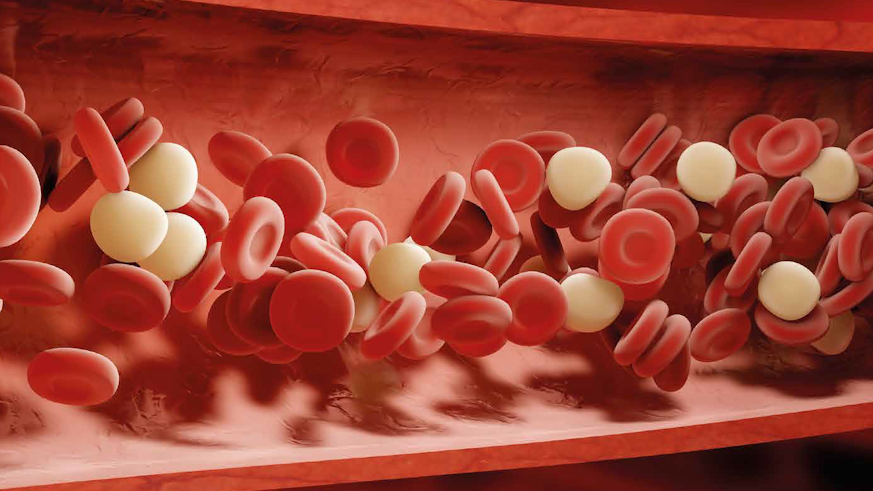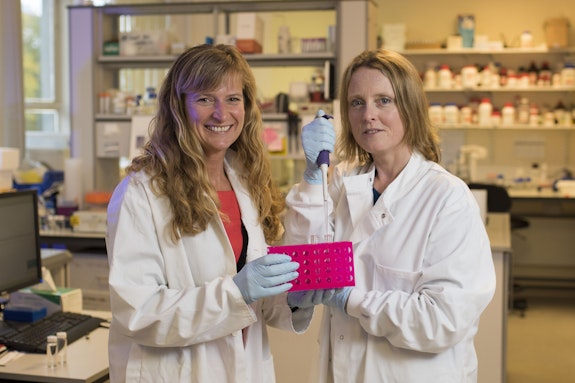Getting to the fat of the matter
1 December 2015

According to the British Heart Foundation, cardiovascular disease (CVD) is the leading cause of death worldwide.Scientists working within Cardiff University’s newly established Systems Immunity Research Institute believe that tiny molecules known as lipids (or “fats”) lie at the root of this epidemic.
To fully understand what lipids do and the role they play in CVD would require a herculean effort. There are tens of thousands of these unique molecules in our bodies – even within a single cell – with an untold number yet to be discovered.
This is the challenge faced by Professor Valerie O’Donnell and her team, made up of biochemists and immunologists. Their fundamental research seeks to unpick the biology of lipids and how they contribute to life-threatening conditions such as blood clots, fat accumulation and hardening of the arteries.
Earlier this year, Joanne Oliver, a former nurse and Area Development Manager for the British Heart Foundation in South Wales, visited Valerie in her lab to find out more about her work and what it means for people living with CVD.

JO: Can you tell me a little bit about your research?
VO: My research is mainly concerned with lipids and how they’re involved in regulating inflammation in cardiovascular disease.
We traditionally think of lipids as the bad guys that navigate through our circulation and do bad things to our vessel walls, leading to heart disease. But that’s a really simplistic view and not entirely correct.
Our team is identifying new lipids made by circulating blood cells, and aims to understand how they regulate normal healthy processes, and what they do when this goes wrong and blood vessels become diseased in CVD.
Lipids perform many important functions. For example, the structure of your cells – your cell membrane – is made of lipids. They’re an important energy source and also act as signalling molecules.
If you were to cut or injure yourself, a number of different blood cells go to the site of injury to stop you bleeding and prevent bacteria from getting in. A big part of how the cells do this is by using lipids to signal to each other. This is called inflammation. But when inflammation happens in the wrong place, then lipids become a major part of the problem.
If these lipids are produced deep in the vessel rather than out where the cut site is, they start setting up inflammatory reactions in the wrong place and that can then be the start of arthrosclerosis (a condition in which an artery wall thickens as a result of fatty plaque deposits).
The work of my group is about discovering new lipids in human cells using mass spectrometry, and then making the new lipids through chemical synthesis so we can understand how they are involved in causing cardiovascular disease and how they regulate inflammation as well as normal healing processes.

The new Institute is allowing us to showcase the work at Cardiff, and put us on the global stage of immunity research.
JO: If BHF supporters asked why we’re funding your research, what can you tell us about the advances you’ve made and the difference it’s made so far?
VO: Our research is very much at the basic science end, so it takes many years to lead to potential benefits for patients.
Understanding what these lipids do is only the beginning. We have to understand the biology of our vascular system before we can hope to develop new treatments for disease.
It isn’t simply a case that eating too much fat causes heart disease. It’s more about the lipids we make in our bodies and how they respond to infection, exercise, smoking, our genes and our lifestyle choices.
At this stage, we are working out what the new lipids we have discovered are doing during development of heart disease. On the other hand, some of our recent work being done with haematologists is aiming to develop new drugs that could promote blood clotting because too much bleeding is a major problem in trauma injury, surgery and inherited bleeding disorders.
Other lipids we have worked on with colleagues in the US are in clinical trials now for inflammatory disorders but still are a way off from becoming actual drugs available for patients. But this is the ultimate aim.
JO: You’re now the co-director of the Systems Immunity Research Institute. How will the new research strategy of the Institute benefit your research area?
VO: The new approach we have taken in the Institute is around applying mathematics and computer sciences approaches to our research - something we increasingly need to do - because these days we generate a huge amount of data and it is a huge challenge to analyse and understand it.
The new Institute is allowing us to showcase the work at Cardiff, and put us on the global stage of immunity research. For my own research it’s been amazing. We have joint projects with researchers in the School of Computer Sciences and Informatics who are helping to write software and automate our processes so we can handle the large amounts of data our mass spectrometers are generating.
This is allowing us to discover more new lipids and is making it easier and quicker to work out which lipids are worth researching in more detailed studies. It’s also allowing us to compare lipids in people with various genetic mutations associated with cardiovascular disease and dementia.
JO: What would you like to achieve in the next five years, with regards to your research?
VO: We have an awful lot to do, including discovering more lipids, working out what they do and then translating them into new ways to diagnose or treat cardiovascular disease and other similar inflammatory disorders.
We believe that a single cell type contains about 5,500 unique lipids of which about half are totally new. It’s more than enough to keep us busy for many years to come.
We work as an interdisciplinary team, including chemists, computer scientists, cell biologists and clinicians. It’s down to the hard work of the entire group that we are managing to get this work done at all.
Read the full interview
This is a shortened version of the full interview that features in the Winter 2015 issue of Challenge Cardiff, our research magazine.
The researcher

Professor Valerie O'Donnell
Professor of lipid biochemistry, Division of Infection and Immunity
- o-donnellvb@cardiff.ac.uk
- +44 (0)29 2068 7313

